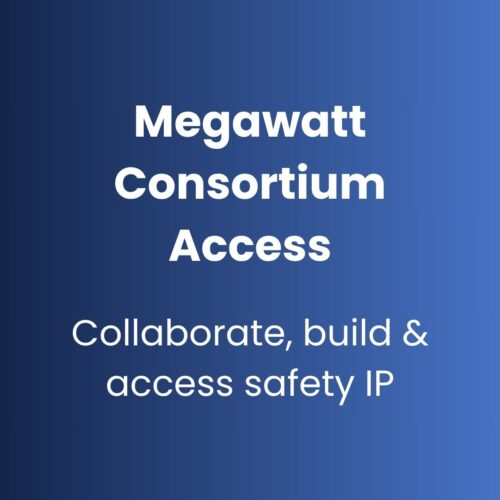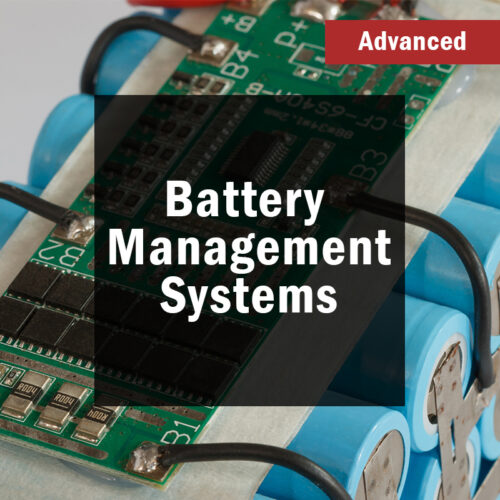-
 The E-Bike Batteries: Design Guidelines for Safety is a comprehensive standard developed by Soteria and industry partners to define best practices and advanced features for safer e-bike battery packs. It provides practical guidance for manufacturers and auditors to design, evaluate, and certify packs that exceed today’s baseline safety levels.
The E-Bike Batteries: Design Guidelines for Safety is a comprehensive standard developed by Soteria and industry partners to define best practices and advanced features for safer e-bike battery packs. It provides practical guidance for manufacturers and auditors to design, evaluate, and certify packs that exceed today’s baseline safety levels. -
 This course introduces essential safety aspects of battery manufacturing, testing, storage, handling, and disposal. It covers administrative and engineering controls, risks and hazards, mitigation, and safety compliance across all phases of the battery lifecycle. Participants will learn to recognize appropriate safety measures, use personal protective equipment (PPE) effectively, and identify key regulations to maintain safety standards and compliance. In addition, emphasis is given to the importance of personal responsibility for safety at all levels of the workplace and throughout the battery lifecycle.
This course introduces essential safety aspects of battery manufacturing, testing, storage, handling, and disposal. It covers administrative and engineering controls, risks and hazards, mitigation, and safety compliance across all phases of the battery lifecycle. Participants will learn to recognize appropriate safety measures, use personal protective equipment (PPE) effectively, and identify key regulations to maintain safety standards and compliance. In addition, emphasis is given to the importance of personal responsibility for safety at all levels of the workplace and throughout the battery lifecycle. -
 This mini-certificate discusses different methods for battery testing. The importance of testing, related standards, needed testing infrastructure and analysis tools are individually tackled. This series also highlights how the output of battery testing is viable for battery modelling that supports the battery use phase and can possibly be implemented on battery management systems.
This mini-certificate discusses different methods for battery testing. The importance of testing, related standards, needed testing infrastructure and analysis tools are individually tackled. This series also highlights how the output of battery testing is viable for battery modelling that supports the battery use phase and can possibly be implemented on battery management systems. -
 This mini-certificate explains how a lithium-ion cell can be designed, sized, and produced for a specific capacity and energy. The key steps in the selection and production of the main components of the cell, i.e. electrodes, separator, and electrolyte, are discussed. The slurry formulation, mixing, coating, drying, calendaring, cutting, stacking, electrolyte formulation/injection, sealing/packing, and formation cycles are detailed both in terms of machineries and the processing parameters.
This mini-certificate explains how a lithium-ion cell can be designed, sized, and produced for a specific capacity and energy. The key steps in the selection and production of the main components of the cell, i.e. electrodes, separator, and electrolyte, are discussed. The slurry formulation, mixing, coating, drying, calendaring, cutting, stacking, electrolyte formulation/injection, sealing/packing, and formation cycles are detailed both in terms of machineries and the processing parameters. -
 This mini-certificate provides a deep yet simple explanation of the operational principles of a rechargeable battery. The certification spotlights the importance and discusses the fundamentals of the ‘electrochemical cell’ which is the heart of any battery system independent of the storage size. A direct link is set forth between the chemical nature of the cell components and the storage properties of interest such as ‘electromotive force’ and gravimetric & volumetric capacities. Specific attention is directed towards lithium-ion batteries by presenting more details about the materials of choice for the anode/cathode together with their synthesis methods.
This mini-certificate provides a deep yet simple explanation of the operational principles of a rechargeable battery. The certification spotlights the importance and discusses the fundamentals of the ‘electrochemical cell’ which is the heart of any battery system independent of the storage size. A direct link is set forth between the chemical nature of the cell components and the storage properties of interest such as ‘electromotive force’ and gravimetric & volumetric capacities. Specific attention is directed towards lithium-ion batteries by presenting more details about the materials of choice for the anode/cathode together with their synthesis methods. -
 This certificate discusses the need of power converters for battery applications. It dives into the different types of power converters and explains the underlying principles. The use of power converters is illustrated via a number of applications. The fundamental concept of efficiency is discussed.
This certificate discusses the need of power converters for battery applications. It dives into the different types of power converters and explains the underlying principles. The use of power converters is illustrated via a number of applications. The fundamental concept of efficiency is discussed. -
 This certificate will allow participants to dive deep into power conversion systems that connect storage systems to smart grids and consumers, learning how to choose the right type of converter while assessing overall system performance with respect to energy efficiency. It also introduces battery management systems and the critical parameters that we can control, the use of battery testing and operation simulation in order to predict real-world in-service behavior.
This certificate will allow participants to dive deep into power conversion systems that connect storage systems to smart grids and consumers, learning how to choose the right type of converter while assessing overall system performance with respect to energy efficiency. It also introduces battery management systems and the critical parameters that we can control, the use of battery testing and operation simulation in order to predict real-world in-service behavior. -
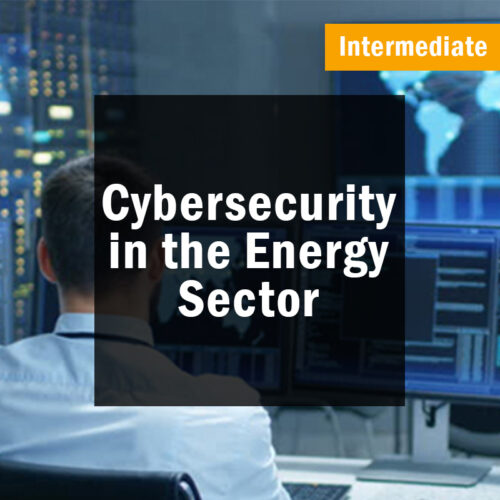 This certificate aims to equip organizations with knowledge and skills to evaluate IT risks and typical vulnerabilities in the context of energy systems. Methods to avoid attacks, amongst other things exploiting human factor related risks, are described and learners will get to know approaches for dealing with security /privacy issues when designing energy data systems (Security /Privacy-by-Design). Imparting an overview of the European legal frameworks and a deeper look into country-specific regulation that have to be considered while building smart grid business models.
This certificate aims to equip organizations with knowledge and skills to evaluate IT risks and typical vulnerabilities in the context of energy systems. Methods to avoid attacks, amongst other things exploiting human factor related risks, are described and learners will get to know approaches for dealing with security /privacy issues when designing energy data systems (Security /Privacy-by-Design). Imparting an overview of the European legal frameworks and a deeper look into country-specific regulation that have to be considered while building smart grid business models. -
 This certificate empowers to expertly assess the challenges, the main drivers and the business opportunities of a changing energy system at different levels of the market. Participants will get a perspective on policy and regulation frameworks as a crucial part of any investment decision and strategy, and will discover real business examples from leading companies that are ground-breaking in their sector.
This certificate empowers to expertly assess the challenges, the main drivers and the business opportunities of a changing energy system at different levels of the market. Participants will get a perspective on policy and regulation frameworks as a crucial part of any investment decision and strategy, and will discover real business examples from leading companies that are ground-breaking in their sector. -
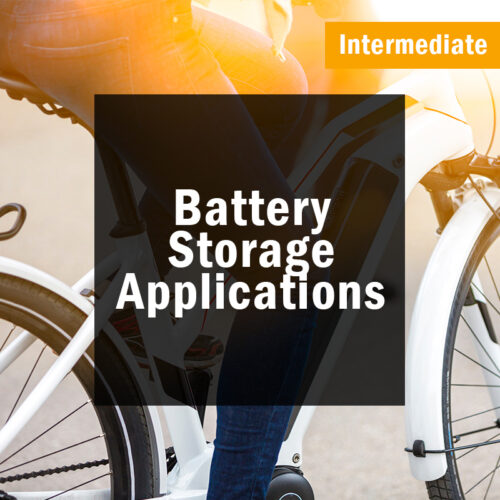 This certificate focuses on real-life applications that will contribute to achieving in practice a low-emission, sustainable future. It gives a deep understanding of battery storage applications across the electric grid, behind-the-meter, storage for electrical mobility, and for industrial applications.
This certificate focuses on real-life applications that will contribute to achieving in practice a low-emission, sustainable future. It gives a deep understanding of battery storage applications across the electric grid, behind-the-meter, storage for electrical mobility, and for industrial applications. -
 This certification provides a rock-solid overview and understanding of the battery value chain, production processes, and end-of-life scenarios. Specifically, participants will explore the battery raw materials, understand how a Li-ion battery is produced, evaluate how to regain value from end-of-life batteries learning about state-of-the-art scenarios related to batteries end-of-life in particular re-use and recycling.
This certification provides a rock-solid overview and understanding of the battery value chain, production processes, and end-of-life scenarios. Specifically, participants will explore the battery raw materials, understand how a Li-ion battery is produced, evaluate how to regain value from end-of-life batteries learning about state-of-the-art scenarios related to batteries end-of-life in particular re-use and recycling. -
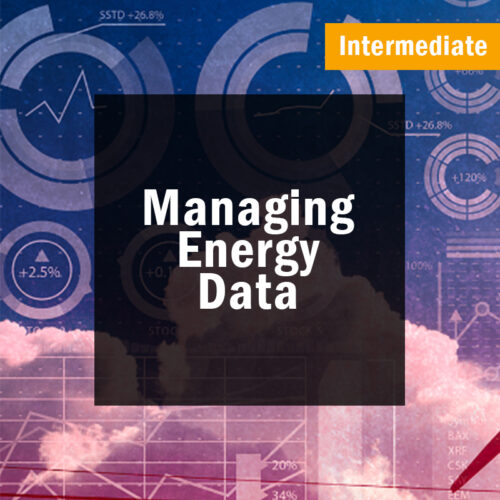 This certificate extract insights from the energy big data to boost your business and create value added services. Participants learn how to develop and implement data science projects in energy businesses. Participants also evaluate the implications, challenges, and benefits of implementing data science projects in an energy company; apply lessons learned from real-life business cases in which data science was applied to energy big data; and supervise the development and implementation of a data science project to create new value with the available data.
This certificate extract insights from the energy big data to boost your business and create value added services. Participants learn how to develop and implement data science projects in energy businesses. Participants also evaluate the implications, challenges, and benefits of implementing data science projects in an energy company; apply lessons learned from real-life business cases in which data science was applied to energy big data; and supervise the development and implementation of a data science project to create new value with the available data. -
 This certificate explores the potential role and position of battery storage in the future European electricity industry, by shedding light on different applications of battery storage. For each of the four main applications of grid-scale, behind-the-meter, off-grid and mobility, you will learn about the most promising services of battery storage in the electricity system that has a large share of renewable electricity. You will discover why the development and deployment of battery storage has been slow, despite it being a promising solution, but also why the time has come for the electricity industry to make smart battery choices.
This certificate explores the potential role and position of battery storage in the future European electricity industry, by shedding light on different applications of battery storage. For each of the four main applications of grid-scale, behind-the-meter, off-grid and mobility, you will learn about the most promising services of battery storage in the electricity system that has a large share of renewable electricity. You will discover why the development and deployment of battery storage has been slow, despite it being a promising solution, but also why the time has come for the electricity industry to make smart battery choices. -
 This mini-certificate provides an understanding on how the future transportation sector will impact the energy system both by putting stress on the electricity grid and by delivering valuable new services to the grid. Participants learn to make a realistic estimation of when our mobility system could go electric and which obstacles need to be tackled first.
This mini-certificate provides an understanding on how the future transportation sector will impact the energy system both by putting stress on the electricity grid and by delivering valuable new services to the grid. Participants learn to make a realistic estimation of when our mobility system could go electric and which obstacles need to be tackled first. -
 This certificate gives you unparalleled insight into the fundamentals of power systems, from direct to alternating current, active to reactive power, and more. You will explore frequency control, how active demand and storage can support the system, and the future evolution of the electricity grid. And you will emerge with a rock-solid understanding of the key issues at play.
This certificate gives you unparalleled insight into the fundamentals of power systems, from direct to alternating current, active to reactive power, and more. You will explore frequency control, how active demand and storage can support the system, and the future evolution of the electricity grid. And you will emerge with a rock-solid understanding of the key issues at play. -
 This certificate has been designed as an introduction to the integration and regulation of different energy systems. You will learn how energy vectors – fuels, electricity, and heating – interact and how to find added value at the interfaces between them. You’ll also build insights into the ways in which energy systems connect to other infrastructures, such as data networks, water, and transportation systems. And you will learn about how consumer psychology and society have a role in building a more sustainable, reliable, and cost-effective energy system.
This certificate has been designed as an introduction to the integration and regulation of different energy systems. You will learn how energy vectors – fuels, electricity, and heating – interact and how to find added value at the interfaces between them. You’ll also build insights into the ways in which energy systems connect to other infrastructures, such as data networks, water, and transportation systems. And you will learn about how consumer psychology and society have a role in building a more sustainable, reliable, and cost-effective energy system.


